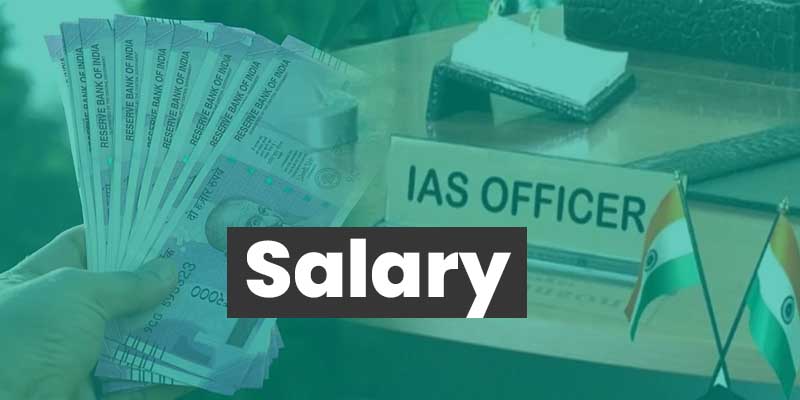Civil services is a great way to serve society and work for the development of your surroundings and the nation. You might have heard about District Collector or Magistrate and the powers they exercise in their allotted districts, you too can become an IAS officer and work as a collector, assistant collector, and sub-divisional magistrate (SDM) and work for the development of the society.
IAS is the short-form of Indian Administrative Services which is the administrative arm of the All India Services of the Government of India. IAS officers serve the Government of India as well as the individual states, and they may also be deployed to various public sector undertakings (PSUs) and international organizations. Here is how you can become an IAS Officer and work for the overall development and administration of the nation.
How to Become an IAS Officer?
- To become an IAS officer, you have to appear for the Civil Services Examination (CSE) conducted by UPSC (Union Public Service Commission).
- And the educational qualification for UPSC CSE is Graduation (passed as well as appearing).
- You can take any stream after the 12th and can apply for Civil Services Exam after graduation.
- The minimum age limit is 21 years and the maximum is 32 years. And the upper age limit is relaxable as per the reservation.
- You can very easily apply for Civil Services Examination online with a nominal fee of 100 rupees. Also, Female/SC/ST/Persons with Benchmark Disability candidates are exempted from the payment of this fee.
- UPSC Civil Services Exam is conducted in two stages; Preliminary and Main (Written and Personality Test).
- The preliminary exam is an objective type (MCQ based) exam which consists of two papers; General Studies Paper I and GS Paper II which is also known as CSAT paper where Paper II is a qualifying paper with minimum qualifying marks fixed at 33%.
- If you pass the preliminary exam, then you can appear for the CSE Main Exam which is descriptive in nature and consists of two qualifying papers and seven papers that are counted for merit.
- Upon passing the Civil Services Main Examination, you can appear for the Personality Test which is basically an Interview.
- The marks of the Mains and Personality Test are counted for merit, and if you qualify for the UPSC Civil Services Examination, then you will be allotted a service as per your rank and preferences mentioned while filling the form for the exam.
UPSC Civil Services Exam Pattern
Preliminary Examination
- CSE Preliminary Examination shall comprise two compulsory Papers of 200 marks each.
- Both the question papers will be of the objective type (multiple choice questions) and each will be of two hours duration.
- Paper I consists of questions related to general studies, current affairs, history, geography, economy, polity, environment, disaster management and other general issues.
- The General Studies Paper-II of the Civil Services (Preliminary) Examination will be a qualifying paper with minimum qualifying marks fixed at 33%.
- Paper II consists of questions related to comprehension, interpersonal skills including communication skills, Logical reasoning and analytical ability, Decision making and problem-solving, General mental ability, Basic numeracy, and date interpretation. This is also known as CSAT paper.
Mains Examination
Qualifying Papers (300 Marks each)
Paper A: One of the Indian Languages to be selected by the candidate from the Languages included in the Eighth Schedule to the Constitution.
Paper B: English
Papers to be Counted for Merit (250 Marks each)
Paper-I: Essay
Paper-II: General Studies-I
(Indian Heritage and Culture, History and Geography of the World and Society)
Paper-III: General Studies-II
(Governance, Constitution, Polity, Social Justice and International relations)
Paper-IV: General Studies-III
(Technology, Economic Development, Bio-diversity, Environment, Security and Disaster Management)
Paper-V: General Studies-IV
(Ethics, Integrity and Aptitude)
Paper-VI: Optional Subject Paper-I
Paper-VII: Optional Subject Paper-II
Note: Duration for each paper is 3 hours.
List of Optional Subjects for CSE Main Exam
You can choose one subject from your own for which you’ll have to give two papers (250 marks each), and the right subject selection can take you to the merit list of the UPSC Civil Services Examination. Here is the list of optional subjects for the CSE Main Examination.
- Agriculture
- Animal Husbandry and Veterinary Science
- Anthropology
- Botany
- Chemistry
- Civil Engineering
- Commerce and Accountancy
- Economics
- Electrical Engineering
- Geography
- Geology
- History
- Law
- Management
- Mathematics
- Mechanical Engineering
- Medical Science
- Philosophy
- Physics
- Political Science and International Relations
- Psychology
- Public Administration
- Sociology
- Statistics
- Zoology
- Literature of any one of the following languages: Assamese, Bengali, Bodo, Dogri, Gujarati, Hindi, Kannada, Kashmiri, Konkani, Maithili, Malayalam, Manipuri, Marathi, Nepali, Odia, Punjabi, Sanskrit, Santhali, Sindhi, Tamil, Telugu, Urdu and English.
Read Also: IAS Jagriti Awasthi Optional and Booklist
UPSC Civil Services Exam Total Marks
The marks of the preliminary exam and the qualifying papers of the Mains exam are not counted for the final merit. So excluding all these, the seven papers of the Civil Services Main Examination make a total of 1750 (250 each) and the Personality Test carries 275 marks, in this way the total marks for UPSC CSE is 2025.
And if you think this exam is too hard to crack, you should look at the marks of the previous toppers. Most of the All India Rank 1 holders also can’t score more than 55%, so in this way it’s hard but if you prepare well with full dedication then you too can qualify for this exam and become an IAS officer.


![UPSC PSIR Optional Syllabus [PDF] Political Science and International Relations PSIR Optional Syllabus UPSC Exam](https://study925.com/wp-content/uploads/2023/02/PSIR-Syllabus-UPSC-.jpeg)



Nice post sir thanks